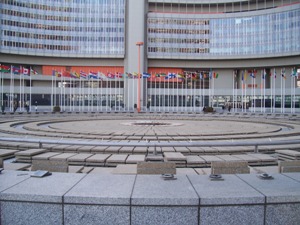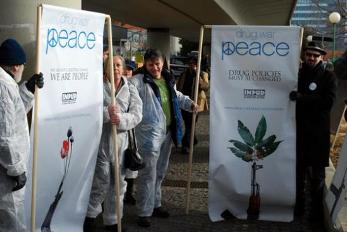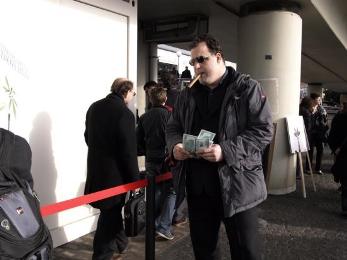The United Nations Commission on Narcotic Drugs (CND) met this week in Vienna to draft a political statement and plan of action to guide international drug policy for the next decade. The statement largely affirms existing prohibitionist policies and ignores harm reduction, as the CND has done it the past. [Editor's note: The draft statement had not been formally approved as of press time, but is likely to be approved as is.]

But while the international community continues to slide down its century-old prohibitionist path regarding non-medicinal drug use and sales, it is encountering an increasing amount of friction. The United States, as leader of the hard-liners, continues to dominate the debates and set the agenda, but an emerging bloc of mainly Latin American and European countries is expressing deep reservations about continuing the same policies for another decade.
The atmosphere in Vienna this week was circus like, complete with street protests, as national delegations, non-governmental organizations (NGOs), and other interested parties heatedly debated what an increasingly vociferous minority called a "failed" approach to the issue. Debate was particularly intense about the inclusion of harm reduction in the political statement -- a position rejected by the US delegation, led by outgoing acting drug czar Edward Jurith.
The drug summit came as the UN, the CND, and the countries pushing the prohibitionist hard-line have come under repeated attack for essentially maintaining the status quo. On Tuesday, the European Commission issued a report that found while in the past decade policies to help drug users and go after drug traffickers have matured, there was little evidence to suggest that the global drug situation had improved.
"Broadly speaking the situation has improved a little in some of the richer countries, while for others it worsened, and for some of those it worsened sharply and substantially, among which are a few large developing or transitional countries," an EC media statement on the report said. "In other words, the world drugs problem seems to be more or less in the same state as in 1998: if anything, the situation has become more complex: prices for drugs in most Western countries have fallen since 1998 by as much as 10% to 30%, despite tougher sentencing of the sellers of e.g. cocaine and heroin in some of these markets."

"Every state that signs up to the political declaration at this commission recommits the UN to complicity in fighting a catastrophic war on drugs," said Danny Kushlick, policy director for Transform. "It is a tragic irony that the UN, so often renowned for peacekeeping, is being used to fight a war that brings untold misery to some of the most marginalized people on earth. 8,000 deaths in Mexico in recent years, the destabilization of Colombia and Afghanistan, continued corruption and instability in the Caribbean and West Africa are testament to the catastrophic impact of a drug control system based upon global prohibition. It is no surprise that the declaration is unlikely even to mention harm reduction, as it runs counter to the primary impact of the prevailing drug control system which, as the past ten years demonstrate, increases harm."
Not all the action took place in the conference hall. Wednesday saw a lively demonstration by NGO groups including Students for Sensible Drug Policy, the drug user group INPUD, ENCOD, and the Hungarian Civil Liberties Union, among others. Protestors spoke to reporters from jail-like cages, waved signs and passed out pamphlets to delegates forced to run their gauntlet, and decried the harms of drug prohibition. One particularly effective protestor was dressed as a sun-glass wearing, cigar-puffing Mafioso, celebrating that business was good thanks to prohibition.
Even UN Office on Drugs and Crime (UNODC) head Antonio Maria Costa, while whistling past the graveyard to insist that progress had been made in the past decade, acknowledged that current global policies have backfired in some ways. Giving the opening address Wednesday, Costa said "the world drug problem has been contained, but not solved" thanks to international anti-drug efforts.
But global drug control efforts have had "a dramatic unintended consequence," he added, "a criminal black market of staggering proportions." The international drug trade is "undermining security and development and causing some to make a dangerous wager in favor of legalization. Drugs are not harmful because they are controlled; they are controlled because they are harmful." Drug legalization would be "a historic mistake," he said.
Even so, Costa painted a dire picture of what prohibition had wrought: "When mafias can buy elections, candidates, political parties, in a word, power, the consequences can only be highly destabilizing" he said. "While ghettoes burn, West Africa is under attack, drug cartels threaten Central America and drug money penetrates bankrupt financial institutions".

"This is coca leaf, this is not cocaine; this is part and parcel of a culture," Morales said. The ban on coca was a "major historical mistake," he added. "It has no harmful impact, no harmful impact at all in its natural state. It causes no mental disturbances, it does not make people run mad, as some would have us believe, and it does not cause addiction."
Neighboring Brazil was also critical. "We ought to recognize the important progress achieved over the last decade," said Brazilian delegate Jorge Armando Felix. "But the achievements have not been accomplished. The aim of a world free of drugs has proven to be unobtainable and in fact has led to unintended consequences such as the increase of the prison population, increase in violence related to an illegal drug market, increase in homicide and violence among the young population with a dramatic impact on mortality and life expectancy -- social exclusion due to drug use and the emergence of synthetic drugs."
Felix also had some prescriptions for UNGASS and the CND. "At this historic moment with the opportunity to reassess the past 10 years and more importantly to think about the challenges to come, Brazil enforces the need for recognition of and moving towards: harm reduction strategies; assessing drug dependence, and HIV AIDS populations; securing the human rights of drug users; correcting the imbalance between investments in supply and demand reduction areas; increasing actions and programs of prevention based on scientific evidence with an emphasis towards vulnerable populations and towards increase of access to and care for problematic or vulnerable drug users; and to the acknowledgment of different models of treatment for the need for increased funding of these efforts."
Brazilian Luiz Paulo Guanabara, head of the NGO Psicotropicus, observed it all with mixed feelings. "Early on, I thought the NGO strategy for harm reduction would not result in anything and that we should aim for drug regulation instead," he said. "And in the end, the term harm reduction is not in the political declaration, but the Beyond 2008 document is very strong and has not gone unnoticed."

But despite the lack of results this time around, Guanabara was thrilled by the participation of civil society. "The civil society mobilization is enormous and intense," he said. "The NGO events around the meeting were the real high-level meetings, not the low-level ones with the bureaucrats at the CND."
While the sentiments from Brazil and Bolivia were echoed by various national delegations, mainly European, and while even the UNODC and the US are willing to give nods to an increased emphasis on treatment and prevention, with the US delegation even going so far as to approve of needle exchanges, at the end of the day, the CND political declaration and action plan represents a stubborn adherence to the prohibitionist status quo.
"Government delegations could have used this process to take stock of what has failed in the last decade in drug-control efforts, and to craft a new international drug policy that reflects current realities and challenges," said Prof. Gerry Stimson, executive director of the International Harm Reduction Association. "Instead, they produced a declaration that is not only weak -- it actually undermines fundamental health and human rights obligations."
American attendee and long-time drug reform activist Michael Krawitz also had mixed feelings. "The slow train wreck that Harry Anslinger started with the 1961 Single Convention is finally grinding to a halt," he said. "The argument here has been a semantic one over harm reduction, but the subtext is much more important, and the subtext is that the treaties were set up to protect public health and are currently being interpreted in such a way as to do the opposite. The declaration wound up being watered down and piled high with reservations. The next five years should prove interesting."
The IHRA and other NGOs called on governments with reservations about the political declaration to refuse to endorse it. That probably will not happen, but some governments have indicated they will add reservations to their approval of the declaration. After a century of prohibition, the first formal cracks are beginning to appear at the center of the legal backbone of global drug prohibition. Given that the dissent has largely appeared only since the last UNGASS in 1998, perhaps this isn't such a bad start.
This work by StoptheDrugWar.org is licensed under Creative Commons Attribution-ShareAlike 4.0 International
Comments
I am soooo glad
to see protests in Vienna.
I wish Americans had the balls to do the same.
With all of the hearings going on in congress right now we should be down there raising hell. But noooo. American reform leadership is too busy drinking cocktails with the prosecutor/politicians who are imposing this terrorist funding and crime promoting policy on the free world.
In reply to I am soooo glad by aahpat (not verified)
drug war
the drug war is nothing but involuntary taxpayer funded welfare for the law enforcement community.
In reply to I am soooo glad by aahpat (not verified)
prohibibition..
When it comes to lawful or not, the powers that be should take into account the compounds that the BIG PHARMAS happily shove down our throats that really are harmful.
There's a bunch of bad stuff that really will kill us. legal or not, these bad boys need to be regulaged.
In reply to prohibibition.. by Anonymous (not verified)
Dangerous drugs
And they are not all controlled drugs either. Seizure meds can kill, too! But, so can Tylenol and Aspirin!
Meet the New Boss, Same as the Old Boss!
The global police state agenda continues. What else needs to be said?
Prohibition by global drug corporations?
Global police using unconstitutional laws to inflate their petrochemiceutical stocks? Prohibition was proven a scam years ago. Drug cartel whether legal or illegal who install dictators to run stock market insider trading scams which turn tyranny into profit for unconstitutional law enforcers is fraud .Period! I wish the military forces of America and everywhere else would remove these wannabe king pins and their petrochemiceutical pharmacies from this planet! We have gone to war against people for a lot less than what the prohibitionists are inflicting. A prohibition paid for by pfizer,merck,eli lilly and all the other petrochemiceutical cartel ? Can you say 150 ft Bernie Madoff Martha Stewart scam?
Protest Walgreens !
Walgreens Petrochemiceutical pharmacies are one of the biggest bribers of unconstitutional law enforcement personnel to continue operating fraudulent prohibitions. We are making large signs and graphs that show show how Walgreens and the prohibitionists they sponsor are in cahoots with terrorist groups such as the taliban and other double standard based tyrannical anti-drug dictators,and were taken the protest to every walgreens! Smearing the so called legal drug corporations by exposing there link to terrorists such as taliban and monsanto and showing how the prohibitionists are getting away with the largest most tyrannical insider trading and human trafficking racket in history!
Did DRCnet send anyone to this?
People! We all have to send in money to DRCnet so that our organization can afford to send people to these events, to be part of the political process, to hand out information to the public and to act as a public witness.
If all of us could send DRCnet $5.00 every month we'd have the ability to get our message out there with real muscle.
DRCnet -- you've got to update the way you get donations -- make it easy for us to donate a small amount more frequently!
Think of it like a thunderstorm. The people who subscribe to this newsletter and who support Drug Reform are the clouds in the sky. The small donations are the raindrops falling to the ground. Each drop is small but together they are a deluge. Making rain isn't difficult -- you just need to find a mechanism which allows a large number of people to donate small amounts with almost no effort.
What if each time we read one of the DRCnet online articles such as this one, there was a 1-click button to donate $1.00 to go to a special fund at DRCnet to support the issues in the article (like Amazon.com's 1-click buy button). ? I'd use it.
How about cell phone texting fund raising?
Maybe we could raise the money to send our people to these events more often....
In reply to Did DRCnet send anyone to this? by Anonymous (not verified)
Yes, we love donations!
Unfortunately, our budget did not allow us to attend, and yes, given a larger budget we would expand our programmatic work...believe me, we are constantly trying. Our donation page -- Donate -- does allow for small monthly donations to be made via credit card or PayPal. Remember, raging rivers form from collective raindrops ;)
David A. Guard
Associate Director
Shoot!!
It was no surprise to me that the gov'ts of UN countries d not want to change a failing policy because their income would diminish greatly. As it stands today they employ millions of people doing tasks that would be devoided if policy changed.
Take these examples: prison building, law enforcement,
court system to name a few.
Blows my mind, doessn't it yours?
In reply to Shoot!! by Anonymous (not verified)
money for DRC
This is precisely why we spread the 'Net word and for the price of one joint our people get there,,,,,,,
U.N. and Global Petrochemiceutical Corporations are Olly North
Everyone against their wars and prohibitions are Freeway Ricky Ross. Oliver North gets labeled hero and gets aided and abetted by fox news giving him his own show while Freeway Ricky ross goes to prison. Scapegoating Wall Street Terrorists must be Destroyed!
Oregon House bill 3274
Provides for state regulated ,organically grown high thc Medical marijuana for patients while providing leftover stems for composite lumber,fiberboard,paper,plastics,cardboard,wood alcohol fuel etc.,and seed crops for food,oil,diesel,etc. Finally a state is actually doing something to restore jobs in this prohibited craft and realizing that high potency plants are superior for every product. Oregons medical marijuana patients and all the mill and craft jobs provided with this bill are a long overdue welcome blessing.
Well put!
Luis Guanabara from Brazil said:
"It seems like the American delegates believe harm reduction is a sin -- or they favor harm increase, so they can lock up more people and have more HIV patients, increase crime, sell more weapons and make money out of the disgrace of others and families' destruction. Their prohibitionist stance is obscene."
How well said! I will borrow Guanabara's words to use in web debates.
Richard Kefalos
Los Angeles
Mr Costa :
You will Never convince most of the people on this planet that you are not secretly profiting from the illegal drug trade you helped create!
UN
[email protected],Vancouver,B.C.Canada I attended the meeting in Vancouver,B.C. last year and listened to the UN representative give lip service to the reform movement and the good points it had made.I have been listening to these people since my first group in 1973.They always condescend to the anti prohibitionist side but when it comes to laying down policy they always side with that tiny minority that is pushing the drug war agenda.I was hopeful,as I'm sure many others were that this time there would be some changes but when it finally came down to making policy they tucked themselves comfortably in bed with the anti drug people and we have another 10 years of UN anti drug policy driven b y the same small group of vested interests and christian right zealots that we've always had running policy.I am beginning to think that the only thing these people understand is numbers and that it's time to give them some numbers they can't explain away.There has been a consensus that over 50% of all north Americans wan t the drug war to stop.Yet these same people are willing,year after year,to sit back while countless people are sent to prison with their lives ruined for life.It's time to put jury nullification into effect.Flood informant lines with the names of politicians and drug officers.write to every member of congress and insist that this drug war be stuffed.Make sure that every member of government that supports this war is turfed out,including the current President who has shown himself to be a hypocrite and a liar.WE are responsible for the current situation,each and every one of us.Those that don't vote are the most responsible.Those that don't bother to check your elected officials voting record are just as culpable.This has gone on far too long.We kn ow we have the numbers to change this.So why are we letting the ignorant and prejudiced members of our government run the show?Why do we let the DEA run roughshod over our god given rights?We take a stand on a day here and a day there.Fuck it.Lets let these thugs know that we're mad as hell and we're not gonna take it an y more.If a few heads have to get broken it won't be the first time the government of this country has ab used it's power and trampled on the rights of the majority.It just takes one man to stand up in the face of tyranny and tell the feds to fuck off.Our freedom has never,at any time since the Mayflower,been trampled under the jack boots of government against the will of the people.Enough is enough.No jury should ever,from this day forward,convict a citisen for doing what is his right to do.Prohibition is not the law of the land but is a travesty that has been cast upon the people with no congressional hearing and in Canada with nothing but acquiescence to the US government.End it today.Just say no!
SENATE JUDICIARY HEARING TUESDAY MARCH 17TH
There will be a United States senate Judiciary Committee Subcommittee on Crime and Drugs hearing âLaw Enforcement Responses to Mexican Drug Cartelsâ
Majority Office
Phone:202-224-7703
Fax:202-224-9516
Minority Office
Phone:202-224-5225
Fax:202-224-9102
Subcommittee on Crime and Drugs
Majority Office
Phone:202-224-0558
Fax:202-228-0623
Minority Office
Phone:202-224-5972
Fax:202-224-9102
Senate Judiciary Committee
Subcommittee on Crime and Drugs
DATE: March 17, 2009
TIME: 10:30 AM
ROOM: Dirksen-226
Please FAX them today your opinion of the war on drugs.
Lets stop
referring to them as a government. Prohibition was proven to be unconstitutional years ago to be a deviant and abrupt continuation of genocide and slavery ;also proven unconstitutional. So lets not even give them the satisfaction of being addressed by any legitimate title.
Take it to the streets!
There is a major escalation and militarization of the drug war going on right this minute in the United States and the drug reform leadership has its collective thumb up its ass.
We need leadership that will take us out to the streets and show this government that Americans oppose the war on drugs. That Americans oppose the militarization and escalation of the war on drugs.
sdfdfg
We need leadership that will take us out to the streets and show this government that Americans oppose the war on drugs. That Americans oppose the militarization and escalation of the war on drugs.
Drug legalization would be a
Drug legalization would be a historic mistake.
Add new comment